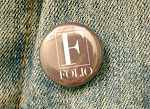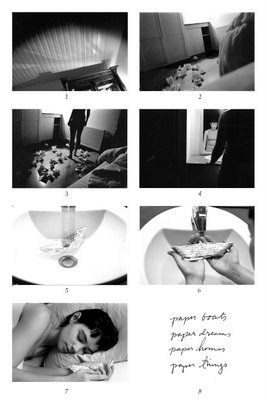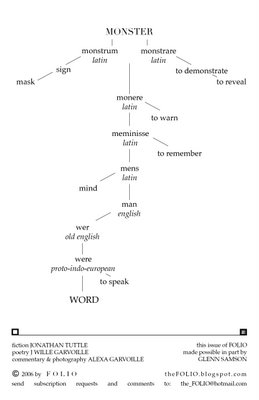
About Me

- Jonathan Tuttle
- FOLIO is a magazine of strange, comic, and strangely comic words and pictures published from 2006 to 2009. For back issues please contact the_folio@hotmail.com.
Issue No. 2, Words - The Concert Mistress
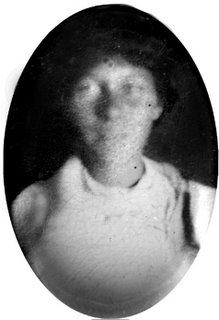
The concert mistress followed me, I assume, out into the lobby during intermission. I was standing in line for a Pepsi and Reese’s when I could feel someone, her, tapping my shoulder. A great deal smaller than myself, she still had to wave for my attention after I turned around. She looked adorable, smiling up at me in her long, black dress covered with—invisible from the stage—tiny, diamond sparkles. “I like you,” she said in a Chinese-accented staccato.
It was the dress and the posture that filled it which made me realize the personage before me. Due to the position of my seat, I could never have recognized the face; all of the violinists looked the same to me, for that matter. But set off against the herded, hunch-backed furs, it was obvious who she was. I managed to mutter a polite, “Hmm?” to which she said again, “I like you.”
The patrons in line behind us began to clear their throats as the gap between me and the person in front of me grew unacceptably large. I apologized and turned back to the concession stand but I felt again the same, small fingers. The concert mistress swung me around by the arm, stood up on her tip-toes and said, loudly this time, “I like you.” Before I could say, “Excuse me?” the clear-throated patrons behind me walked up and filled the gap themselves.
I was not, however, without a place to stand. The mistress pulled me across the lobby and stood me at the water fountain. She held each of my shoulders firmly in front of hers, squeezing them as if she were planting me into the carpet, and said again, this time slowly, mouthing the words grotesquely in case I were deaf, “I…LIKE…YOU.” I shook my head, honestly bewildered. I attempted to complement her performance but she interrupted by saying, tapping her sternum on each word, “I…LIKE.” She then poked my chest, hard, and said, “YOU.”
“Well, thank you,” I said. “You’re very kind.” She squinted and frowned and I could see her in her eyes wondering, perhaps, if that were defeat. She must have decided it was for two seconds later she let go of me and walked off, shoulders slumped and her head down, into the crowd. I do not know why, but it made me very sad to watch her walk away. I no longer had any appetite for a Pepsi, not to mention a Reese’s.
I excused myself through the line leading to the women’s restroom and walked to the men’s. While washing my hands, I glanced up to the mirror and recognized something new in my reflection. Certainly the lank of my torso and the droop of my spine were as I last saw them, and the feathery, red hair and the crisp, smart bow-tie de rigueur, but there was a look behind my eyes and mouth that looked back at me anew. The idea struck me: It’s only her poor English preventing her from expressing something quite true!
The lobby lights were off when I came out of the restroom, allowing me to see perfectly across the lobby and through its crowds the diamond sparkled dress of the concert mistress, just then sliding behind a curtain. When the lights came on again and the ushers rang their bells, I called out to the dress. “No, no!” I said. “I understand! You’re contracting the ‘AM’!”
Immediately, she turned around, that smile I saw when she first tapped my shoulder fully returned to her face. I sprinted across the lobby floor to her, never minding how many mingling enthusiasts I pushed from my path. I grabbed her squarely by the shoulders and said, “I AM like you!” She nodded giddily and repeated, “I am like you! I see you from stage! I am like you!”
The house lights came down on the settling crowd, stealthily unwrapping their contraband Reese’s. The orchestra, too, were making themselves comfortable, ending their final private rehearsals and self-tunings. Eager to move things along, the audience applauded right upon seeing the door in the back flat open. I stepped out and the applause weakened considerably. Giving a good pat on the back to the principal percussionist—the one with the largest mallet—I wound my around the violinists and took my place at the center-front of the stage. I looked out to my old seat in the second mezzanine, at my friend the concert mistress, her smile covered in melted chocolate. I blew big kisses with both hands to her. I announced to her for all to hear, “Let ‘like’ be assumed, I AM YOU.”
My imaginary coat tails swung behind me as I turned to tune my peers. The principal wind held out in silence. The winds did not match pitch, neither did the strings. The second tubaist yelled out, “Who the hell are you?” I think it was the second tubaist. My stand partner was not overjoyed to see me, either. After I knocked our music to the ground with my unwieldy bow, she refused to accept my apology.
I heard the back flat open again behind me. I had attended enough concerts to know that when the back flat opens for the head honcho everyone pats their thighs and bangs the stage with a foot, so I banged away. But I soon found, still in silence, that the flat had opened not for the maestro but for two security guards, each eventually with one of my arms in their hands. They dragged me across the stage, my feet limp and lagging behind, as I tried to explain to the best of my ability the events of that night’s intermission.
A true friend, the concert mistress left the concert hall with me, although a bit more gracefully, unaided by large men with guns. In the parking lot, she told me to ditch her violin. We took my car and without even discussing it drove straight to the mall. We skipped hands-held to the photo booth, pulled the curtain, and exchanged each other’s clothes. There is a loving strip of us, my orange chest hair spilling out of her low-necked blouse, her hands lost in the elbows of my jacket. We are smiling and making faces.
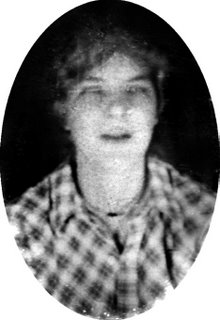
Issue No. 2, Words - There Are Poems Beyond Reproach
there are some poems beyond reproach
whose time-sick authors often gutter
and then blacken with ill-timed flame!
there are some moments pass us blind
that only in brightest afterthought
we are shown exactly how re-frame!
there are deadly nightmares we approach
whose roaring monsters often mutter
some once distinct and much-loved name!
there are wakeful instants we are kind,
whose twisted aftertastes have brought
us wonder the sour nature of this game!
there are small candles we light and coach
in arts of fire---through cupped hands we utter
curses at fistful winds we cannot tame!
there are small prayers sent out, aligned
to the spectra of starlight, with nought
to guarantee any answer to our aim!
whose time-sick authors often gutter
and then blacken with ill-timed flame!
there are some moments pass us blind
that only in brightest afterthought
we are shown exactly how re-frame!
there are deadly nightmares we approach
whose roaring monsters often mutter
some once distinct and much-loved name!
there are wakeful instants we are kind,
whose twisted aftertastes have brought
us wonder the sour nature of this game!
there are small candles we light and coach
in arts of fire---through cupped hands we utter
curses at fistful winds we cannot tame!
there are small prayers sent out, aligned
to the spectra of starlight, with nought
to guarantee any answer to our aim!
Issue No. 2, Words - Fragments
A kid on the bus told me I can’t trust everything I read or see on TV. I imagined a page in a library book: a paragraph, a photograph, and a caption – a phib! I was repulsed. “A whole library filled with lies!” I imagined a news anchor with her fingers crossed behind her back. “Now what I am I supposed to do?” I decided the kid was full of it. I’d trust everything I read or saw on TV. But I wouldn’t trust him. I wouldn’t trust what people said about books and TV.
-Everything’s a mess, the kids were up in arms, running around like Banshees-
-What’s a Banshee?
-It’s an expression.
-A Banshee is an expression?
-Like a Banshee. Crazy.
-I see.
“Do you like balloons?” the doctor asked the little girl. “Yes.” “Good, because right now your lymph nodes are like balloons.”
David slew Goliath with a psalm.
I was on the elevator with a stranger. The stranger tapped the elevator floor with his foot and said to me mischievously, “The ground.”
A girl passes time in a Barnes and Noble reading about her astrological sign. “Leo—You are ugly.” “Well,” she said, “that read me like a book.”
There is a dearth of words spoken directly to you and many, many words spoken just past you. You gradually learn how to listen to the words spoken past you and you correctly mistake the words spoken to you as your own.
-Everything’s a mess, the kids were up in arms, running around like Banshees-
-What’s a Banshee?
-It’s an expression.
-A Banshee is an expression?
-Like a Banshee. Crazy.
-I see.
“Do you like balloons?” the doctor asked the little girl. “Yes.” “Good, because right now your lymph nodes are like balloons.”
David slew Goliath with a psalm.
I was on the elevator with a stranger. The stranger tapped the elevator floor with his foot and said to me mischievously, “The ground.”
A girl passes time in a Barnes and Noble reading about her astrological sign. “Leo—You are ugly.” “Well,” she said, “that read me like a book.”
There is a dearth of words spoken directly to you and many, many words spoken just past you. You gradually learn how to listen to the words spoken past you and you correctly mistake the words spoken to you as your own.
Issue No. 2, Words - A Defense of Reading

In the age of Poetry Defended, narrative dominates the public sphere. Anyone with a computer can be an internationally acclaimed poet, millions of escapists worldwide stop their days for televised fiction, books take nations by storm, and artists are pop icons. Society has come full circle since the Philosopher banished the Poets from his Republic. The Poet has now become the Philosopher King, leading the world towards the blinding light of ideal forms as distributed by cable networks across the universe, while the position of the Reader, our hero, Philosopher-like in her questioning of forms, is degraded to the former inferiority of the Poet. Because the Reader does more than just watch and because she directs her critical activity at something other than the physical forms of this world, she is taken for a threat to artistic pleasure, by the Poet, and to social productivity, by the Political Activist.
To the Poet, the Reader’s extension of the Poet’s creative world is a rebellious and presumptuous deconstruction, an appropriation of meaning as dangerous to his world as nuclear testing is to ours. The Reader disrupts the peace of simple viewing by insisting on a mistrust of forms. She extends the chain of signifiers beyond the literal reading of text as reality role-playing.
To the Activist, the Reader’s sincere concerns for fiction are trivial as compared to “real life” problems (like nuclear testing), and he hopes any critical discussion will further his causes. While political and social dissent is very real and sometimes fruitful, the interpretive dissent of the Reader is regarded as fruitless by the Activist.
Reading does not engage a representation of reality – neither the Poet’s fictional reality nor the Activist’s global reality – but rather culminates in the presentation of an experience, in which an equal exchange takes place between the Reader and another element, whether it be Text, Author, or community of Readers.
Intentional concerns (’what does the author mean?’) and confusion of text with reality (over-identification with a character, for instance) inhibits a Reader from being critical, from exercising a careful evaluation, a comprehensive understanding of a text that can be made available to her in the experience of reading. Reading is a personal relation with and a reinterpretation of a text and deserves to be practiced by everyone, not solely a limited number of published Literary Critics.
Reading, like Poetry, is a creative art. Just as the artist perceives and reinterprets the world around him, to the delight of others, the Reader perceives and reinterprets a textual world. So why is the Reader necessarily a failed poet, as the Poet was a failed philosopher, conjuring forms twice removed? The Reader is rather a creator in her own right, the missing link between Poet and Philosopher, experiencing and reinterpreting objects in reality, words themselves.
Subscribe to:
Comments (Atom)
